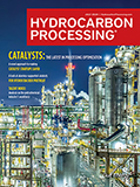Danger that demands an all-hands-on-deck approach
MPLX’s Marine Transportation team moves crude oil and refined products along the Ohio and Mississippi rivers and their tributaries, as well as Intracoastal waterways, meaning a slip or trip could require a life-saving water rescue if a crew member fell overboard. According to the U.S. Coast Guard and American Waterways Operators (AWO), falling overboard was the leading cause of crew member fatalities in the freight-carrying and towing industry between 2000 and 2017, accounting for 79 deaths.
As with every operation, there’s a steadfast focus on safety. This includes a comprehensive “man overboard” prevention course, that helps Marine Transportation maintain an accident-free, incident-free workplace. With operations that include 23 towboats, approximately 260 barges and a marine repair facility (MRF), Health, Environmental and Safety Technician Eric Fetty utilizes employee discussions to promote awareness of best practices and keep everyone “onboard.”
“Marine is fortunate to have many experienced workers, and several have been in this industry with other companies and have diverse backgrounds,” said Fetty. “There are many stories shared and words of wisdom, along with improvement ideas for the course.”
From words to action
The training is required of all new Marine Transportation employees, and existing employees must take a refresher course every two years. The classroom portion of the one-day training concentrates on prevention, including hazard recognition, body positioning, situational awareness and cold-water immersion. During the second half of the day, participants apply their knowledge by using rescue equipment, such as life rings and a rescue rope gun, wearing personal flotation devices and using bodies of water to practice response tactics. Approximately 350 employees have completed the course in the past two years.
Weather, especially in the winter, can introduce a variety of safety obstacles with rain, fog, changing river conditions and ice. Health, Environmental and Safety Professional Patrick Kouns emphasizes the importance of employees watching out for each other to avoid falling into water without anyone knowing. Crews are instructed to use the buddy system and must get permission from supervisors to deviate from it.
Response time is critical if a person falls into cold water. “Hypothermic symptoms occur at multiple stages and can lead to shock and loss of function, restricting the ability to move in water,” Kouns said. “We practice the HELP (heat-escape lessening posture) position that is to be used in the water and teach the importance of slowly warming rescued persons.”
An industry model
The training program has received praise and recognition from outside MPLX. Representatives of both the Coast Guard and AWO have gone through the course themselves. AWO also publicized the course in its newsletter and had Marine Transportation representatives deliver a training presentation to industry peers at the 2018 AWO national safety committee meeting.
Kouns suggested the course is likely to evolve, reflecting MPLX’s commitment to continual improvement. He pointed to potential enhancements that could come from ongoing employee feedback and emerging technology. Marine Transportation is evaluating GPS units that attach to personal flotation devices to help locate employees in water, along with remote-controlled floats that could be steered to someone who has fallen overboard. Ultimately, it all supports one main goal.
“We want employees to have each other’s backs and always think of their loved ones to keep them focused on staying safe, so they can return home in the same condition as when they arrived… except, maybe, a little tired,” said Kouns.






Comments